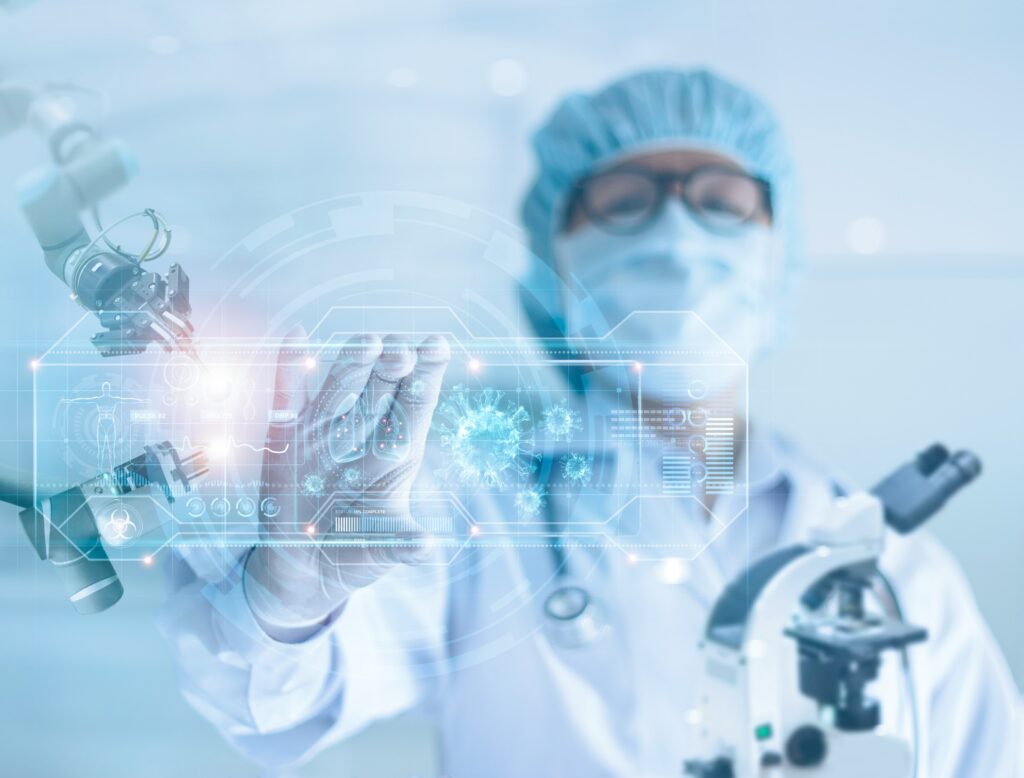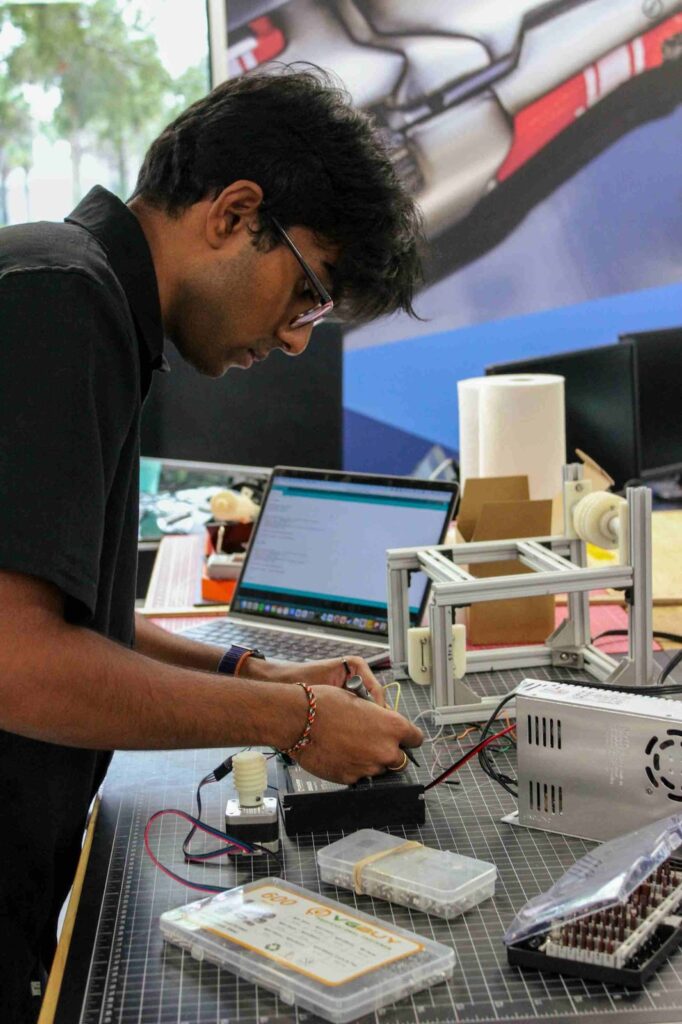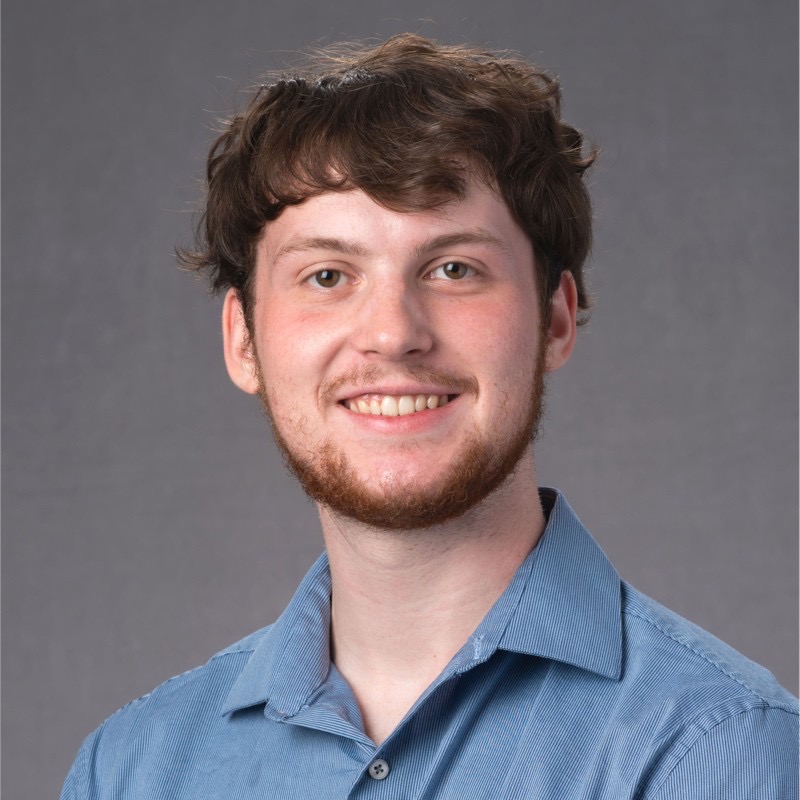Pavan Senthil was inspired walking through a convention hall and seeing the technology that doctors and engineers had created for people with disabilities. Wheelchairs that worked even if a person couldn’t use their arms and legs. AI-assisted robots that provided 24/7 care at home and reported any emergencies to the patient’s healthcare team. Training tools that helped stroke patients regain their fine motor skills.

And that’s when he understood the promise of his Medicine-Engineering Double Degree (MEDD) from UCF.
The unique partnership between UCF’s colleges of Medicine and Engineering & Computer Science allows undergraduates to earn two baccalaureate degrees – one in mechanical engineering or any other engineering discipline UCF offers – and one in biomedical sciences. The program recognizes that the future of healthcare is in technology and that the workforce needs trained professionals who can understand both the biology of disease and the engineering principles to create new healthcare solutions.
MEDD is demanding, requiring 163 credit hours to earn the two degrees. To date seven students have completed the program.
“The MEDD program is probably the most challenging undertaking at UCF on the undergraduate level,” says Dr. William Self, professor of medicine who leads undergraduate education at the Burnett School of Biomedical Sciences and helped create the medicine-engineering program. “This small cohort of scholars are driven by their desire to help mankind in the areas of healthcare and medicine through the engineering principles they learn along the way. I am so proud of these students for their drive and perseverance to complete this path and look forward to seeing how they impact society in the future.”
Senthil will graduate in August and hopes to work for a company that makes assistive devices or create his own start-up. Fellow student Michael Meyers graduated last spring and will begin his master’s in electrical engineering this fall at UCF. He wants to develop better ways to diagnose diseases through enhanced imaging technologies, such as A-I-assisted X-rays and non-invasive visual biopsies.
Limbitless Provides Inspiration for Medicine-Engineering Partnerships
Senthil always thought his future would include medical school. But while living in Texas during high school, he discovered how Texas A&M’s EnMED program encourages engineering majors to attend medical school and use their problem-solving skills to improve patient care. Senthil, a National Merit Scholar, received information from UCF about the MEDD program and the Burnett Honors College. UCF also offered a scholarship and a university visit. He liked UCF’s campus life and met other students who had used their MEDD studies to achieve their dreams. He decided to become a Knight.

On campus, he became active in Limbitless Solutions, Inc., a UCF organization that creates and provides 3D-printed, EMG-powered prosthetics for clinical trial participants. He started with technological development and then became part of the clinical research team, where he worked with patients and their families to understand how the prosthetic limbs worked and could increase independence. “We don’t create this technology to fix someone,” he says. “The goal is to give them tools to express themselves.”
The UCF Limbitless experience also provided Senthil with research opportunities. He has published research in multiple journals and presented his scientific findings at UCF and even nationally. One of those presentations was at RESNA, the Rehabilitation Engineering and Assistive Technology Society of North America. The non-profit professional organization is dedicated to maximizing “the health and well-being of people with disabilities through technology.”
Senthil was considering graduate and medical school when he saw the scope of assistive technologies on display at the conference. His new career goal – develop technology to help people. “I want to create a device that fills a need, that enables others,” he said. “My passion is helping people improve their lives.”
Improving Diagnostics Through Imaging
Meyers grew up in the Orlando area. His mother is a nurse, and he always expected to be a pre-med major. Then, like Senthil, he received communication from UCF about the MEDD program and the Burnett Honors College. “The dual degree broadens our experience,” he says, “and gives you a big step up in applying what you’ve learned in school.”
He acknowledges the double degree courseload is tough, laughing as he discusses three lab courses each semester and having to train your brain to “flip flop” from memorizing microbiology terms to thinking about logical engineering processes. But he says his flip-flopping brain helped him better understand difficult subjects like immunology. “Engineering helped me understand why and how processes are happening when the body is fighting a disease,” he said.

At UCF, he used his dual training in research and in practice. He was an undergraduate research assistant in UCF’s Nanobio Sensors Lab and did internships at Northrop Grumman and Mitsubishi Power Americas.
He credits a class with UCF Electrical Engineering Professor Wasfy Mikhael with inspiring him to understand how imaging and signal processing can create new systems to help physicians better see diseases like cancer in the body. That will be the focus of his masters training.
“The body in and of itself, is a well-oiled machine,” Meyers says. “With my dual degree, I want to figure out a way moving forward to make it even better.”